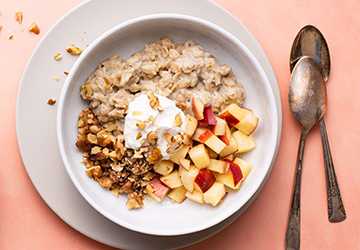How to Eat Clean and Nourish Your Body
Eating clean is about choosing whole, natural foods and minimizing processed items. It's a way to nourish your body with essential nutrients while avoiding unnecessary additives and preservatives. Focusing on fresh fruits, vegetables, lean proteins, whole grains, and healthy fats can help support your overall health and well-being.

This guide will help you understand how to eat clean, offering practical tips to make it easier and more enjoyable. Whether you're just starting or looking to refine your approach, these insights will help you make better daily food choices.
What Does It Mean to Eat Clean?
Eating clean means focusing on foods as close to their natural state as possible; this includes fruits, vegetables, whole grains, lean proteins, and healthy fats. It also means avoiding processed foods, refined sugars, and artificial ingredients. The goal is to nourish your body with high-quality foods that provide essential nutrients.
Benefits of Eating Clean
There are several benefits to eating clean:
Improved Digestion: Whole foods are easier to digest and help maintain a healthy gut.
More Energy: Natural foods offer sustained energy, whereas processed foods can lead to energy spikes and crashes.
Better Skin: Clean eating can improve your skin’s appearance by providing essential vitamins and minerals.
Weight Management: Eating clean can help you maintain a healthy weight by reducing calorie intake from processed foods.
Enhanced Mental Clarity: Nutrient-rich foods support brain health, improving focus and concentration.
Reduced Inflammation: Eating clean reduces inflammation in the body and lowers the risk of chronic diseases.
Essential Components of Clean Eating
Fruits and Vegetables: Fruits and vegetables are the cornerstone of clean eating. They are rich in vitamins, minerals, and antioxidants. Aim to fill half your plate with various colourful fruits and vegetables at each meal, ensuring you get a wide range of nutrients.
Whole Grains: Whole grains like brown rice, quinoa, oats, and whole wheat are excellent sources of fibre, vitamins, and minerals. They help keep you full longer and stabilize blood sugar levels. Avoid refined grains like white rice and white bread, which have been stripped of nutrients.
Lean Proteins: Lean proteins are essential for muscle repair and growth. Choose sources like chicken, turkey, fish, beans, and legumes. These options are lower in saturated fat than red and processed meat, making them healthier.
Healthy Fats: Healthy fats are crucial for brain health and hormone production. Include sources like avocados, nuts, seeds, and olive oil. Avoid trans fats and limit saturated fats, which can negatively impact heart health.
Tips for Clean Eating
Read Labels: If you buy packaged foods, read the labels to avoid added sugars, artificial ingredients, and unhealthy fats.
Cook at Home: Preparing meals at home allows you to control the ingredients and avoid hidden additives.
Stay Hydrated: Drink plenty of water throughout the day. Avoid sugary drinks and excessive caffeine.
Plan Your Meals: Planning helps you make healthier choices and reduces the temptation to eat processed foods.
Practice Moderation: You don't have to be perfect. It's okay to indulge occasionally, as long as most of your diet is clean.
Shop Smart: Create a grocery list based on clean eating principles to avoid impulse buys of processed foods.
Clean Eating on a Budget
Eating clean doesn’t have to be expensive. Here are some tips to help you eat well without breaking the bank:
Buy in Bulk: Buying bulk items like grains, beans, and nuts is often more cost-effective.
Seasonal Produce: Buy fruits and vegetables that are in season. They are usually cheaper and fresher.
Frozen Foods: Frozen fruits and vegetables can be just as nutritious as fresh ones and often cost less.
Plan Your Meals: Planning helps you buy only what you need and avoid wasting food.
Cook in Batches: Cooking large meals and freezing portions can save time and money.
Grow Your Own: If possible, grow your herbs and vegetables. It's cost-effective and ensures you have fresh produce.
Sample Clean Eating Meal Plan
Here’s a simple meal plan to get you started with clean eating:
Breakfast: Kick off your morning with oatmeal topped with fresh berries, nuts, and honey. For a nutritious boost, you could also try a green smoothie made with spinach, banana, almond milk, and chia seeds.

Lunch: For lunch, enjoy a quinoa salad with mixed greens, cherry tomatoes, cucumber, and grilled chicken. Another option is a vegetable stir-fry with brown rice and tofu, providing a healthy and satisfying meal.
Dinner options include baked salmon, roasted sweet potatoes, and steamed broccoli. Lentil soup, served with whole-grain bread, is another hearty choice.
Snacks: For snacks, opt for fresh fruit like apples, oranges, or berries. Nuts and seeds like almonds, walnuts, or sunflower seeds are also excellent choices. Raw veggies like carrot sticks, cucumber slices, or bell pepper strips with hummus make a crunchy and healthy snack.
Overcoming Common Challenges
Cravings for Processed Foods
It’s normal to crave processed foods, especially if you’re used to eating them regularly. Here’s how to handle cravings:
Find Healthy Alternatives: Swap unhealthy snacks for healthier options. For example, choose air-popped popcorn instead of chips.
Stay Hydrated: Sometimes, thirst is mistaken for hunger. Drink water before reaching for a snack.
Keep Healthy Snacks on Hand: Healthy options can help you resist temptation.
Eating Out
Eating clean while dining out can be challenging, but it’s possible with a few strategies:
Choose Wisely: Opt for dishes that feature whole foods. Salads, grilled meats, and vegetable sides are good choices.
Ask for Modifications: Don’t hesitate to ask for changes, like dressing on the side or substituting fries with a salad.
Watch Portions: Restaurant portions can be significant. Consider sharing a meal or saving half for later.
Avoid Sauces and Dressings: These can contain hidden sugars and unhealthy fats. Ask for them on the side, or skip them altogether.
Staying Motivated
Staying motivated is vital to maintaining a clean eating lifestyle. Here are some tips to help you stay on track:
Set Realistic Goals: Start with small, achievable goals. Gradually incorporate more clean foods into your diet.
Track Your Progress: Keep a food journal to track your eating and feelings. This can help you identify patterns and stay motivated.
Find Support: Join a clean eating group or find a buddy to share your journey with. Having support can make it easier to stick to your goals.
Celebrate Small Wins: Acknowledge your progress and reward yourself with something enjoyable that aligns with your goals.
Conclusion
Eating clean is a powerful way to nourish your body and improve your health. By focusing on whole, natural foods and minimizing processed items, you can enjoy the benefits of better digestion, more energy, and enhanced well-being. Start with small changes and gradually incorporate more clean foods into your diet. Remember, the goal is progress, not perfection.
With these tips and strategies, you can make clean eating a sustainable and enjoyable part of your lifestyle. Embrace the journey and take it one step at a time, making choices that support your health and well-being.